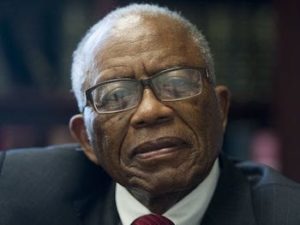
Fred Gray
*Fred Gray was born on this date in 1930. He is a Black civil rights attorney, preacher, and activist.
Born in Montgomery, Alabama, Fred David Gray attended the Loveless School, where his aunt taught, until the seventh grade. He attended the Nashville Christian Institute (NCI), a boarding school operated by the Churches of Christ. He assisted the NCI president in visiting other churches of the predominantly white denomination. After graduation, Gray was admitted to Alabama State College for Negroes, and received a baccalaureate degree in 1951. Encouraged by a teacher to apply to law school despite his earlier plans to become a historian and preacher, Gray moved to Cleveland, Ohio, and received a Juris Doctor degree from Case Western Reserve University School of Law in 1954. At the time, no law school in Alabama would admit Blacks.
After passing the bar examination, Gray returned to his hometown and established a law office. He also began preaching at the Holt Street Church of Christ, where his parents had been members. In 1957, Gray became a licensed preacher of the Churches of Christ. In 1974, he helped merge the denomination's white and Black churches in Tuskegee, Alabama, where he had moved. Gray also served on the board of trustees for Southwestern Christian College, an HBCU near Dallas, Texas, affiliated with the Churches of Christ. In 2012, Lipscomb University in Nashville, Tennessee, affiliated with the Churches of Christ, bestowed a doctorate of humane letters honoris causa upon Gray 2012. Gray once challenged Lipscomb's segregation practices.
During the 20th-century American Civil Rights Movement, Gray came to prominence working with Dr. Martin Luther King, Jr. and E.D. Nixon, among others. He litigated several major civil rights cases in Alabama, including some that reached the United States Supreme Court for rulings. In some of his first cases as a young Alabama attorney (and solo practitioner), Gray defended Claudette Colvin and later Rosa Parks. They were charged with disorderly conduct for refusing to seat themselves in the rear of segregated city buses. After Alabama Attorney General John Malcolm Patterson effectively prohibited the NAACP from operating in Alabama in 1956, Gray provided legal counsel for eight years until the organization was permitted to operate in the state. He also successfully defended Martin Luther King, Jr. from tax evasion charges in 1960, winning an acquittal from an all-white jury.
Other notable civil rights cases brought and argued by Gray included Dixon v. Alabama (1961, which established due process rights for students at public universities), Gomillion v. Lightfoot (1962, which overturned state redistricting of Tuskegee that excluded most of the majority-Black residents; this contributed to laying a foundation for "one man, one vote") and Williams v. Wallace (1963, which protected the Selma to Montgomery marches). Alabama resisted the integration of public schools following the U.S. Supreme Court's decision in Brown v. Board of Education (1954), which ruled that the segregation of public schools was unconstitutional. Gray successfully represented Vivian Malone and James Hood, who had been denied admission to the University of Alabama and entered the university despite Governor George Wallace's Stand in the Schoolhouse Door incident.
In 1963, Gray successfully sued Florence State University (now the University of North Alabama) for Wendell Wilkie Gunn, who had been denied admission based on race. Gray also led the successful effort to desegregate Auburn University. In 1963, Gray filed the Lee v. Macon County Board of Education case, which 1967 led a three-judge panel of U.S. District Judges to order all Alabama public schools not already subject to court orders to desegregate. Lawsuits filed by Gray helped desegregate more than 100 local school systems and all public colleges and universities in his home state. In 1970, Gray and Thomas J. Reed became the first African Americans elected as legislators in Alabama since Reconstruction.
Gray also represented plaintiffs in the class-action lawsuit about the federal Tuskegee Syphilis Study. The 40 subsequently infected spouses and 19 congenitally infected children were compensated with medical, health, and burial benefits managed by the USPHS's Centers for Disease Control and Prevention (CDC) several years later. As a result of the lawsuit and settlement, the 1979 Belmont Report was prepared, and Congress passed federal laws. In 1980, President Carter nominated Gray to be a judge on the United States District Court for the Middle District of Alabama to fill a vacancy; Gray later asked his nomination to be withdrawn. Gray married the former Bernice Hill, his secretary, in 1955, and they had four children.
He is also a member of Omega Psi Phi and Sigma Pi Phi. He served as the President of the National Bar Association in 1985 and 2001 and was elected as the first Black President of the Alabama State Bar. Gray's autobiography, Bus Ride to Justice, was published in 1994 and a revised edition in 2012. On July 7, 2022, Gray was awarded the Presidential Medal of Freedom.